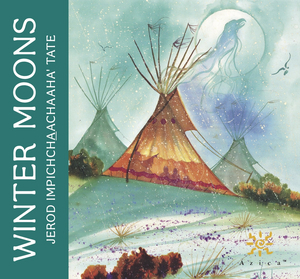Jerod Tate to Release New Album WINTER MOONS On Azica Records
Winter Moons was Tate's very first composition, commissioned by and dedicated to his mother, choreographer Dr. Patricia Tate.

On Friday, August 5, 2022, Chickasaw composer and U.S. Cultural Ambassador Jerod Impichchaachaaha' Tate will release a new album, Winter Moons, on Azica Records. Winter Moons is a ballet in four movements based upon American Indian legends from the Northern Plains and Rocky Mountains, performed with a live storyteller to guide the audience. The title of the ballet is derived from the ancient idea that American Indian stories - some serious historical narratives, and others lighthearted bedtime stories for children, but all usually carrying a moral - are best told during the full moons of the wintertime. Winter Moons was Tate's very first composition, commissioned by and dedicated to his mother, choreographer Dr. Patricia Tate. Spirit Chief Names the Animal People was part of the original version of Winter Moons and is now performed as a separate work with narrator.
Patricia Tate shares, "According to the Osage, the Moon is a woman, and all women are symbolic of life. In the ballet, the four moons represent the four seasons of life. Winter Moon tells of the culmination of life as she rises majestically to the spirit world."
The ballet weaves together stories about Puberty Blessing Songs, a rite of passage for young Lakota women; the Indian spirit at Mesa Falls, a tragic Shoshone tale of two lovers getting swept away by a waterfall; the Medicine Wheel, in the Big Horn Mountains of Wyoming, a place of great importance to Northern Plains Indians; and the Pend d'Oreilles legend of Bitterroot Valley, when an old woman cried upon the earth during a famine and her tears formed the roots of a new plant, a bitter edible blossom that fed her people.
Spirit Chief Names the Animal People is an Okanagan story in which The Great Chief calls all animals together to inform them that a new kind of people are coming to live on the earth. Each animal was instructed to come back at the first morning light to choose their new name to be called forever. Each wanted a proud name and more power, and all were determined to get up early and hurry to be the first to choose its fate. Jerod Tate says, "For the Indian, the coyote represents the ultimate, negative example: a quick-witted schemer with a glib tongue. His greatest flaw is pride and self-importance. In his scheming ways, he always claims more than he is capable of, regardless of the consequences."
Coyote boasted that no one would be ahead of him, and said he would not sleep that night so he could be the first to be named by the Great Spirit Chief. As the night passed, and Coyote's eyes grew heavy. He picked up two sticks and braced his eyelids apart, but soon he was fast asleep, although his eyes were propped open.
Early in the morning, Coyote jumped at the sound of his wife Mole's voice and ran to the lodge of the Spirit Chief, but it was too late. He had been asleep while all the other animals took their new names. Coyote sank down in front of the Great Spirit Chief and the heart of the Great Chief was touched. He was so impressed by Coyote's ability to think for himself, although to selfish ends, that he reversed the importance of the animals and put Coyote in charge of finishing up the world. The Great Chief said, "It is for you to conquer the people. For doing that, for all the good things you do, you will be honored and praised by the people that are here now, and that come afterward. But, for the foolish and mean things you do, you will be laughed at and despised. That you cannot help. It is your way."
About Jerod Impichchaachaaha' Tate
Jerod Impichchaachaaha' Tate is a classical composer, citizen of the Chickasaw Nation in Oklahoma, and is dedicated to the development of American Indian classical composition. The Washington Post raves that "Tate is rare as an American Indian composer of classical music. Rarer still is his ability to effectively infuse classical music with American Indian nationalism."
Tate is a 2022 Chickasaw Hall of Fame inductee, a 2022 Distinguished Alumni Award recipient from The Cleveland Institute of Music and was appointed 2021 Cultural Ambassador for the U. S. Department of State. He is Guest Composer, conductor, and pianist for San Francisco Symphony's Currents Program, Thunder Song: American Indian Musical Cultures, and was recently Guest Composer for Metropolitan Museum of Art's Balcony Bar Program, Home with ETHEL and Friends, featuring his commissioned work Pisachi (Reveal) for String Quartet.
His commissioned works have been performed by the National Symphony Orchestra, San Francisco Symphony and Chorus, Dallas Symphony Orchestra, Detroit Symphony Orchestra, Minnesota Orchestra, Buffalo Philharmonic Orchestra, Oklahoma City Philharmonic, Winnipeg Symphony Orchestra, South Dakota Symphony Orchestra, Colorado Ballet, Canterbury Voices, Dale Warland Singers, Santa Fe Desert Chorale and Santa Fe Chamber Music Festival. Recent commissions include Shell Shaker: A Chickasaw Opera for Mount Holyoke Symphony Orchestra, Ghost of the White Deer Concerto for Bassoon and Orchestra for Dallas Symphony Orchestra, Hózhó (Navajo Strong) and Ithánali (I Know) for White Snake Opera Company. His music was recently featured on the HBO series Westworld.
Tate has held Composer-in-Residence positions for Music Alive, a national residency program of the League of American Orchestras and New Music USA, the Joyce Foundation/American Composers Forum, Oklahoma City's NewView Summer Academy, Oklahoma Medical Research Foundation and Grand Canyon Music Festival Native American Composer Apprentice Project. Tate was the founding composition instructor for the Chickasaw Summer Arts Academy and has taught composition to American Indian high school students in Minneapolis, the Hopi, Navajo, and Lummi reservations and Native students in Toronto.
Tate is a three-time commission recipient from the American Composers Forum, a Chamber Music America's Classical Commissioning Program recipient, a Cleveland Institute of Music Alumni Achievement Award recipient, a governor-appointed Creativity Ambassador for the State of Oklahoma and an Emmy Award-winner for his work on the Oklahoma Educational Television Authority documentary, The Science of Composing.
In In addition to his work based upon his Chickasaw culture, Tate has worked with the music and language of multiple tribes, such as: Choctaw, Navajo, Cherokee, Ojibway, Creek, Pechanga, Comanche, Lakota, Hopi, Tlingit, Lenape, Tongva, Shawnee, Caddo, Ute, Aleut, Shoshone, Cree, Paiute, and Salish/Kootenai.
Among available recorded works are Iholba' (The Vision) for Solo Flute, Orchestra and Chorus and Tracing Mississippi, Concerto for Flute and Orchestra, recorded by the San Francisco Symphony Orchestra and Chorus, on the Grammy Award-winning label Azica Records. In 2021, Azica released Tate's Lowak Shoppala' (Fire and Light) recorded by Nashville String Machine with the Chickasaw Nation Children's Chorus and Dance Troupe; vocal soloists Stephen Clark, Chelsea Owen, Meghan Vera Starling; and narrators Lynne Moroney, Wes Studi, Richard Ray Whitman. Of the album, Sequenza21 wrote, "Tate has clearly taken the Western musical tradition and found a compelling voice that integrates his native culture." His Metropolitan Museum of Art commission, Pisachi (Reveal), is featured on ETHEL String Quartet's album Documerica. In 2022, Azica Records releases Tate's first composition, Winter Moons, and also his Moonstrike, recorded by Apollo Chamber Players.
Tate earned his Bachelor of Music in Piano Performance from Northwestern University, where he studied with Dr. Donald Isaak, and his Master of Music in Piano Performance and Composition from The Cleveland Institute of Music, where he studied with Elizabeth Pastor and Dr. Donald Erb. He has performed as First Keyboard on the Broadway national tours of LES MISERABLES and Miss Saigon and been a guest pianist and accompanist for the Colorado Ballet, Hartford Ballet, and numerous ballet and dance companies.
Tate's middle name, Impichchaachaaha', means "his high corncrib" and is his inherited traditional Chickasaw house name. A corncrib is a small hut used for the storage of corn and other vegetables. In traditional Chickasaw culture, the corncrib was built high off the ground on stilts to keep its contents safe from foraging animals. Learn more at www.jerodtate.com.
Winter Moons Tracklist
Jerod Impichchaachaaha' Tate - Winter Moons (1992)
1. Introduction (The Four Moons) - Winter Moon - Puberty Blessing Songs [13:11]
2. The Indian Spirit at Mesa Falls [9:36]
3. Red Plume and The Medicine Wheel - The Origin of Bitterroot [11:34]
4. She Runs With the Wind - Finale [6:30]
Jerod Impichchaachaaha' Tate - Spirit Chief Names the Animal People
5. Coyote [2:16]
6. Bear [2:18]
7. Salmon [1:57]
8. Eagle [3:27]
9. Coyote (reprise) [1:51]
Winter Moons Orchestra
Frank J. Toth, Conductor
Recorded at Kulas Hall Cleveland Institute of Music
Executive Producer: Jerod Impichchaachaaha' Tate
Producer: James Perez Bonney
Recording Engineer: Bruce Egre
Mastering Engineer: Alan Bise
Cover Art: "Winter Moons" by Victor Runnels
ACD-71350
Comments

Videos
